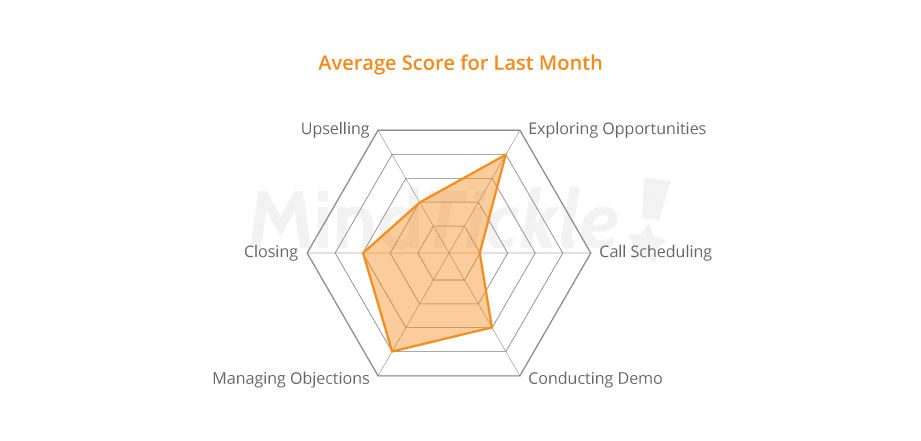It’s the Year of the Coach
Coaching is at the top of everyone’s minds at the moment – for good reason. A good coach can help more salespeople achieve quota by up to 10% and when you combine training and coaching, sales productivity also increases.
With these results, it’s no surprise that everyone is jumping on the coaching bandwagon, but not all coaching impactful.
According to the International Coaching Federation, coaching is:
“An interactive process to help individuals and organizations develop more rapidly and produce more satisfying results; improving other’s ability to set goals, take action, make better decisions and make full use of their natural strengths.”
Impactful coaching focuses on the needs of your reps and helps them improve how they approach different parts of the sales process or their customers. The results from impactful coaching go straight to your topline revenue.
Managers that are not impactful fail to move the needle on reps’ behavior and/or their performance. They just don’t have the skills required of a coach – perhaps they’re doing less coaching and more telling or controlling. Reps’ learn little from being told what they’re doing wrong, impactful coaching is a collaborative way to help them learn how to improve how they sell. Sometimes coaching is ineffective because managers just aren’t doing it properly — perhaps they’re just ticking a box or scoring their team more favorably in coaching exercises due to bias or even apathy.
It is possible to turn ineffective coaches into impactful ones, but in order to do that, you need to identify who is actually ineffective. Every sales manager is different, and short of watching every coaching session, it can be difficult to objectively know whether they’re making a difference to their reps’ performance. To do this you require data – but not just any data – the right data.
Identifying whether sales coaches are ineffective or impactful
The Sales Capability Index™ (SCI) is an index that has been developed by Mindtickle, which provides a capabilities score that, for the first time in the industry, provides a holistic, quantified assessment of sales rep and team readiness while also producing a leading indicator of their expected performance.
Essentially, the SCI provides a holistic, quantified assessment of individual sales reps and a manager’s entire team’s sales readiness. This is then linked to their performance, producing a leading indicator of their expected performance.
The SCI combines not only coaching but also knowledge and skill, so you can see what’s really impacting performance and what’s not. For example, if you’ve just launched a new product, coaching program, competitor series or other sales enablement initiatives to your sales team, you can see what elements have had an impact and by looking at scores before and after.
The score gives you a high level of conviction about how prepared your sales teams are and identify what initiatives are making an impact and what aren’t. It will also give you an indication of whether coaching (or other initiatives) are likely to impact your sales results so you can predict revenue more accurately.
As the data can be broken down by individual and by team, you can also see whether individual sales managers are coaching effectively – are they making a difference to the sales outcomes or not. This brings issues with sales manager’s coaching abilities to the surface, so they can be addressed long before the quarter or year is lost.
Coaching is only effective if it drives a business outcome. There is no point having your management team spend hours each week coaching reps if your top line revenue doesn’t grow. By using this data, coaching can be directly linked to real outcomes.
The same data can be used for most sales enablement initiatives. So if you launch a new product you can also look at the curriculum that was delivered to reps and assess whether it’s helped them sell or not. This helps you measure your enablement initiatives and identify where they need to be adjusted to make a real impact on your sales teams.
Coaching needs to have specific criteria for maximum effectiveness
In order to be effective, sales managers also need to know what to coach. No rep needs to be developed in every aspect of the sales process, but trying to find what they need help with isn’t always clear-cut.
By breaking down down the entire sales process and connecting each step with the enablement data that you have, you can look at sales competencies across each stage. This shows you exactly where a rep or a sales manager may need help.
The chart below gives you an example that shows you a rep that is able to explore opportunities and manage objections well, but perhaps needs help upselling and in call scheduling. The data pinpoints exactly where opportunities fail and evaluates qualitatively and quantitatively what competencies are needed at that specific stage.

This level of granularity allows managers to do tactical coaching and allows you to identify whether sales managers have skewed competencies. It gets to the heart of the issue and allows you to hone in on what needs to be done.
When looking at your sales team as a whole, it means you can identify if there is consistency across how teams are coached or if managers are perhaps playing to their strengths to the detriment of their team’s performance.
This kind of data has the potential to be a game changer. It can help identify bias in coaching performance and gives you the opportunity to address it objectively.
Empowering end users
A final way to improve impactful coaching across your sales teams is to give users the ability to approve or disapprove coaching feedback. Rather than just letting the sales managers have a say about how a coaching session went, let the reps tell you if they felt the session made a difference to them. This data can also be telling, because if your reps don’t feel like they’re benefitting from their coaching sessions, then it may be symptomatic of a broader problem – either with your coaching program or with individual coaches.
We all have so many tools in our sales stack, each providing an array of data. While it’s nice to have these numbers at our fingertips, they’re irrelevant if they can’t tell you how to improve your sales outcomes. After all, who has time to look through every data point available to them and work out what they’re saying.
For the Year of the Coach to make a real difference to your sales outcomes, you need to ensure that you have access to data that clearly and succinctly helps you link your coaching plans to your sales outcomes like the SCI does.


